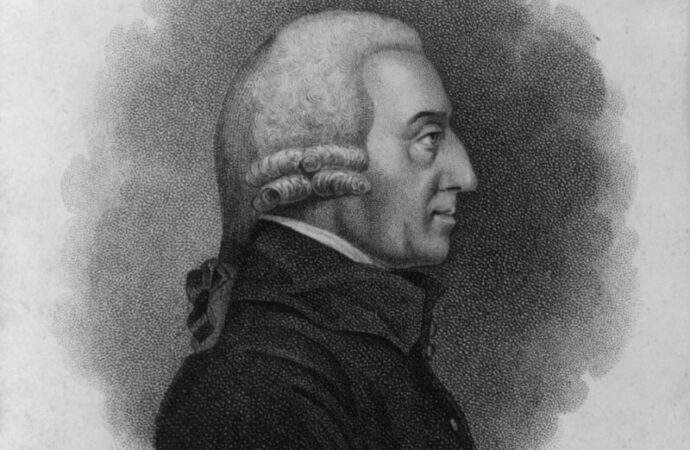Adam Smith is best known for writing The Wealth of Nations, but in a way, his work in economics took a back seat to his moral philosophy. In fact, Smith thought that his first book, The Theory of Moral Sentiments, was more important than his economic theory. It’s in this book, for example, that Smith first writes of the “invisible hand.” This is why everyone who wants to understand Adam Smith the economist needs to read Adam Smith the moral philosopher.
In The Theory of Moral Sentiments, Smith lays the framework for his later work in economics. He starts by arguing against the popular idea of an inborn moral conscience. Instead of getting our morality from some innate source, he says that we learn to behave morally because we are fundamentally social creatures.
Smith also departs from some earlier philosophers by claiming that we do not reason our way to right action. Instead, we are guided by our emotions—especially a feeling that he calls “sympathy,” one that we might today call “empathy.” In his view, rational reflection plays a secondary role to the social emotions.
As he says:
We suppose ourselves the spectators of our own behaviour, and endeavour to imagine what effect it would, in this light, produce upon us. This is the only looking-glass by which we can, in some measure, with the eyes of other people, scrutinize the propriety of our own conduct.
In other words, we can improve our behavior through moral reasoning, but only with reference to other people.
Above all else, Smith emphasizes the social aspect of morality. Yet that doesn’t mean that he thinks people are naturally unselfish or self-sacrificing. Nor should they be, for as Smith sees it:
Every man is, no doubt, by nature, first and principally recommended to his own care; and as he is fitter to take care of himself, than of any other person, it is fit and right that it should be so. Every man, therefore, is much more deeply interested in whatever immediately concerns himself, than in what concerns any other man.
It is because of our privileged self-knowledge that we have a responsibility to think about and care about ourselves. Smith calls this practice “self-love,” and it plays a central role in his later economic theories. His point is not that people should pursue self-interest above all else. Rather, he thinks that when people love themselves properly, everyone benefits.
For Smith, self-love and sympathy are inextricably linked. As he sees it, we love others because we love to see them happy. Thus, when we care for ourselves, we learn to care for others as well. In his words:
Concern for our own happiness recommends to us the virtue of prudence; concern for that of other people, the virtues of justice and beneficence—of which the one restrains us from hurting, the other prompts us to promote that happiness.”
Rather than being in conflict, Smith sees an important harmony between loving one’s self and loving others.
Harmony is a consistent theme in Smith’s work. It underlies one of the most important concepts in his economic theory, which can already be seen in The Theory of Moral Sentiments:
The rich only select from the heap what is most precious and agreeable. They consume little more than the poor; and in spite of their natural selfishness and rapacity, though they mean only their own conveniency, … they divide with the poor the produce of all their improvements. They are led by an invisible hand to make nearly the same distribution of the necessaries of life which would have been made had the earth been divided into equal portions among all its inhabitants; and thus, without intending it, without knowing it, advance the interest of the society, and afford means to the multiplication of the species.
To Smith, the market is not the sphere of unrestrained self-interest and fraud. Rather, it is a natural extension of man’s social nature. He saw that people are passionate creatures, immensely influenced by the feelings and sentiments of those around them. Together, they can make society as harmonious as a symphony.
—
Image credit: public domain
2 comments















2 Comments
Allen Roth
August 10, 2024, 5:19 pmInteresting perspective on Smith
REPLYSwissarge
August 13, 2024, 11:13 amAnother time, when America was not inundated with people without moral principles, and when avarice and greed create a class that was unknown back then.
REPLYOur forefathers would be weeping if they were alive today.